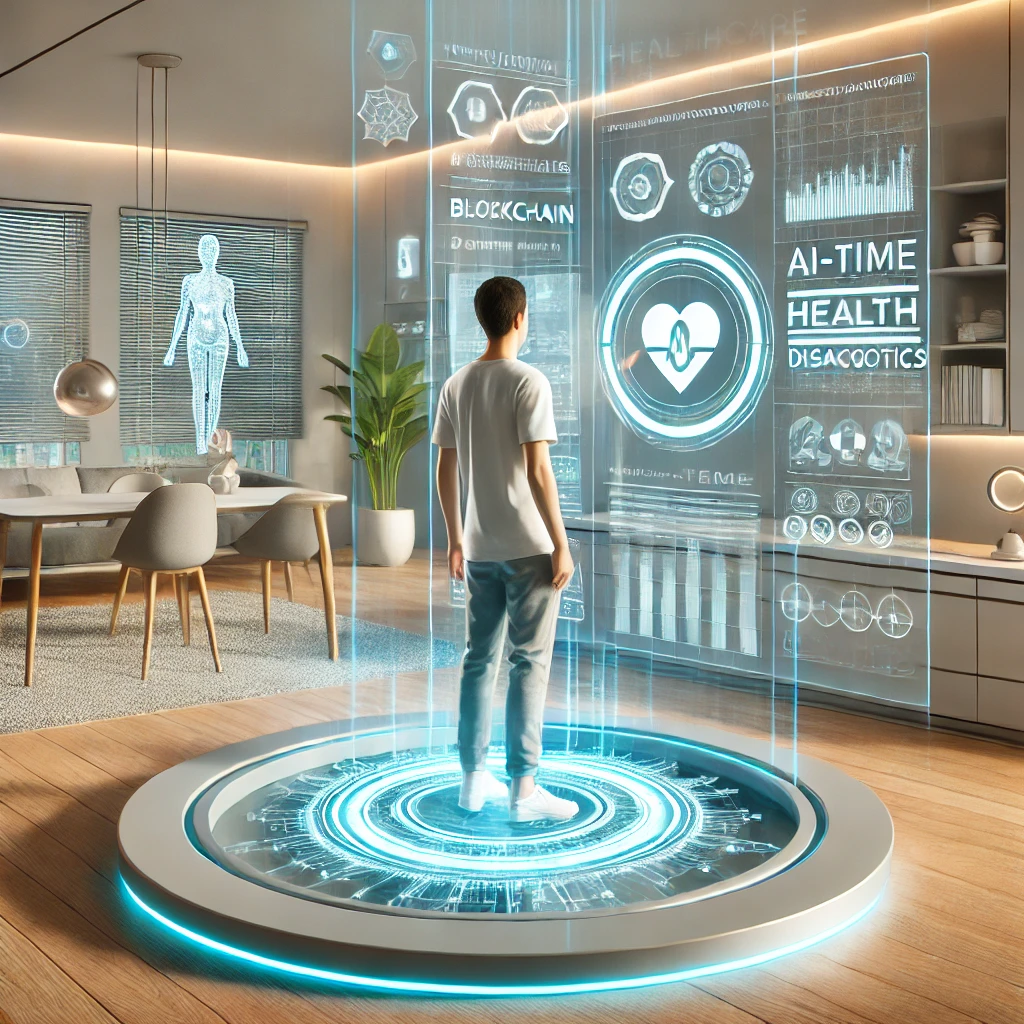The Future of Healthcare: A Decade of Transformation with In-Home Care, AI, Blockchain, and a Cultural Shift in Diagnostics

Over the past decade, we’ve seen massive shifts in industries like transportation, hospitality, and travel, driven by innovation and technology. Services have become faster, more convenient, and more accessible. However, these changes have yet to transform healthcare at the same scale. In the next 10 years, we predict that the healthcare industry will experience a similar transformation, with in-home care (IHC), artificial intelligence (AI), blockchain technology, and a revolutionary platform that will change the way we access and interpret diagnostic tests.
IHC: The Shift from Inpatient and Outpatient Care to In-Home Care
Inpatient and outpatient care have long been the standard for medical services, but they come with challenges: long wait times, high costs, and often impersonal service. Urgent care centers have bridged the gap in recent years, but they are still part of a system that’s slow to adapt.
The future of healthcare lies in In-Home Care (IHC). IHC provides the convenience of receiving medical attention in the comfort of your own home, whether it’s through telemedicine, mobile health technicians, or home-based diagnostic tools. This model is not only more affordable but also highly personalized. Over the next decade, IHC will become the new standard, reducing the need for traditional urgent care centers and dramatically changing the way we think about healthcare delivery.
The Role of AI in Revolutionizing Healthcare
AI is already making waves in healthcare, but we are only beginning to see its full potential. Currently, AI is used for tasks like predictive analytics, imaging analysis, and administrative support. In the future, AI will move into a more direct role in patient care, particularly in in-home diagnostic testing and results interpretation.
AI-powered diagnostic tools will make it possible to receive real-time health insights, cutting down on the need for in-person consultations. These tools will not only analyze test results but also offer personalized treatment recommendations tailored to each patient’s unique health data.
However, it’s essential that AI development remains unencumbered by bureaucracy and overregulation. Innovation must be allowed to thrive, especially in the healthcare space, where there’s so much potential to improve lives. AI development must also focus on specialized, fine-tuned models that can offer greater value than generic large language models (LLMs). These fine-tuned models will be better suited to handle the complexities of healthcare data, making diagnostics more accurate and personalized than ever before.
The Intersection of AI and Blockchain in Healthcare
For AI to truly revolutionize healthcare, it must be built on a foundation of trust, security, and transparency. This is where blockchain technology comes into play. Blockchain provides a decentralized and immutable ledger, ensuring that patient data is secure, transparent, and accessible only to authorized parties.
A hybrid blockchain model—with both public and private chains—will be key to managing medical records. The private chain will ensure sensitive patient data is securely stored and accessible only by authorized healthcare professionals, while the public chain will provide transparency for non-sensitive information, ensuring that the use of healthcare data is auditable and transparent.
Blockchain also opens the door to tokenization of medical data. Imagine a world where patients are not just passive participants in the healthcare system but actively benefit from their data. Companies could use anonymized medical data for research and development while compensating patients through a revenue-sharing model powered by tokens. Every time a company accesses or uses patient data, patients could earn tokens, effectively monetizing their own health data. This system empowers patients and creates an ethical approach to data usage in healthcare.
AI will play a critical role in articulating the results of these medical records, helping patients understand the insights derived from their data in a clear and actionable way. This seamless integration of AI and blockchain will ensure that healthcare remains secure, accessible, and personalized.
Our Platform: Driving a Cultural Shift in Healthcare
At the heart of this healthcare revolution is the platform we’re building. Much like how Uber, Airbnb, and other platforms transformed transportation and hospitality, we are creating a platform that will reshape healthcare by making diagnostic testing and result interpretation more accessible, affordable, and convenient.
Our platform is designed to bring fast, accurate diagnostic testing directly to patients through a combination of AI, blockchain, and in-home care services. With the help of our diagnostic assistant, patients can easily interpret their test results without needing a full telehealth consultation. The diagnostic assistant offers real-time insights into health data for a fraction of the cost, bringing the cost of result interpretation down to as low as $10. This is a significant difference compared to the $49.99–$99.99 range for traditional telehealth consultations.
While our platform prioritizes speed and convenience, we still offer access to traditional health coaches and MDs for those who prefer a more hands-on approach. The combination of AI-driven diagnostics and human expertise ensures that patients receive the best of both worlds—convenient, fast healthcare when they need it, with the option for deeper consultations when required.
The Future is Here, and We’re Leading the Way
Over the next decade, the healthcare industry will undergo a cultural shift that mirrors the changes seen in other sectors. In-Home Care, AI, and blockchain will revolutionize how we approach health diagnostics, making care more accessible, affordable, and secure for everyone.
Our platform will be a crucial part of this shift, providing real-time diagnostic tools that empower patients to take control of their health, while also giving them the opportunity to monetize their data in an ethical, transparent way. By combining these cutting-edge technologies, we’re ensuring that healthcare is no longer confined to hospitals and clinics—it’s now in the hands of the people.
